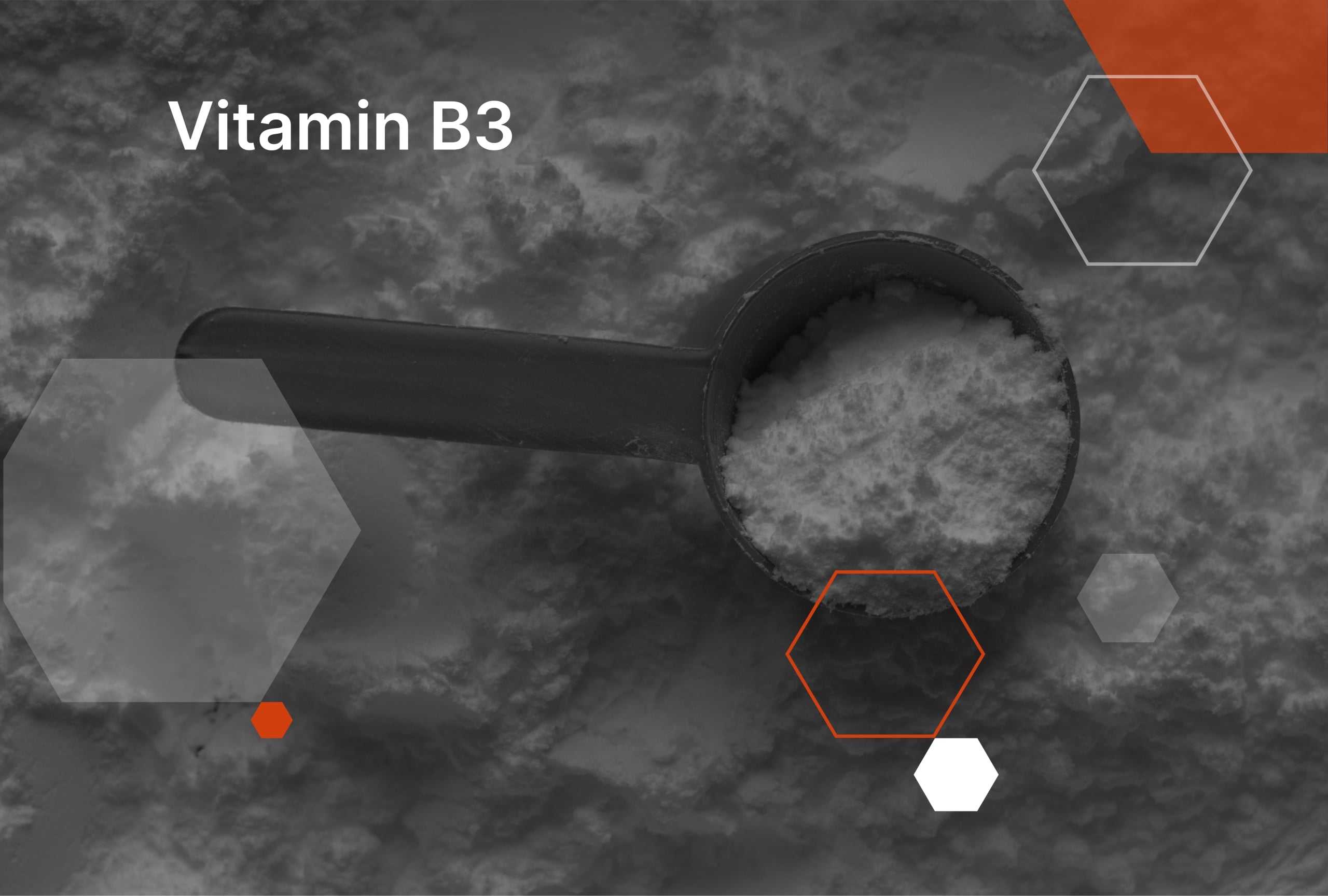Kemiex is an all-in-one market information, purchasing and sales platform for animal and human nutrition raw materials. In the following series of articles, we will explain the functions and uses of products that can be found in the Kemiex marketplace. On this occasion, we are going to explain the benefits of Vitamin B3 or Niacin:
What is Vitamin B3 used for?
Niacin, also known as Vitamin B3, is an essential nutrient that the body requires to maintain good health. It plays a crucial role in many biological processes, including the metabolism of energy, the maintenance of healthy skin, and the proper functioning of the nervous and digestive systems. Niacin is also involved in the production of hormones and the synthesis of DNA. The human body can produce small amounts of Niacin, but it must be obtained primarily through the diet. Niacin is water-soluble, meaning that the body does not store excess amounts and any excess is excreted in the urine.
What are the main benefits of Niacin?
Some of the key uses and benefits of Vitamin B3 include:
1. Improves Energy production:
Niacin is involved in the conversion of food into energy, particularly in the metabolism of carbohydrates and fatty acids.
2. Helps Nervous system:
Niacin is important for the proper function of the nervous system, as it helps to maintain healthy skin and the integrity of the mucous membranes that line the digestive and respiratory tracts.
3. Supports DNA synthesis:
Niacin is involved in the synthesis of DNA and other genetic material, which is essential for cell growth and division.
4. Improves Healthy skin:
Niacin is important for maintaining healthy skin and preventing skin conditions such as pellagra, which is caused by a deficiency of Niacin.
5. Supports Cardiovascular health:
Niacin has been shown to lower cholesterol levels and improve cardiovascular health by reducing the risk of heart disease.
Overall, Niacin is an important nutrient that provides many health benefits and is essential for maintaining good health. It can be found in a variety of food sources, including meat, poultry, fish, nuts, and whole grains, and is also available in supplement form for those who have difficulty getting enough of this nutrient through diet alone.
Which foods are the main sources of Niacin?
Vitamin B3, or Niacin, can be found in a variety of foods, making it easy to get enough of this important nutrient through diet. Some of the best food sources of Vitamin B3 include:
1. Meat: Beef, pork, poultry, and fish, such as salmon and tuna, are good sources of Niacin.
2. Nuts: Peanuts, almonds, and pecans are good sources of the vitamin.
3. Legumes: Lentils, chickpeas, and black beans are good sources of Niacin.
4. Whole grains: Whole grain products, such as whole wheat bread, brown rice, and oatmeal, are good sources of Niacin.
5. Dairy products: Milk and yogurt can contain small amounts of Niacin.
6. Eggs: Eggs, particularly egg yolks, are good sources of the vitamin.
7. Fortified breakfast cereals: Some breakfast cereals are fortified with Niacin.
8. Fortified bread and pasta: Some bread and pasta products are fortified with Niacin.
9. Fruits: Fruits, such as avocados and dates, are good sources of Niacin.
10. Vegetables: Certain vegetables, such as bell peppers and mushrooms, are good sources of the vitamin.
Overall, Niacin is widely available in a variety of foods, making it relatively easy to get enough of this essential nutrient through diet alone. However, for those who have difficulty getting enough Niacin through diet, supplements may be recommended to ensure adequate intake.
Recommended daily intake (RDI) of Vitamin B3
The recommended daily intake (RDI) of Vitamin B3, also known as Niacin, varies based on age and gender. According to the National Institutes of Health (NIH), the following are the RDIs for Niacin:
-
Adult men: 16 milligrams (mg)
-
Adult women: 14 mg
-
Pregnant women: 18 mg
-
Breastfeeding women: 17 mg
It is important to note that these values may vary depending on individual needs and health conditions, and it is always best to consult a healthcare professional for personalized recommendations.
What are the main benefits of Vitamin B3 or Niacin for animals?
Vitamin B3 is essential for animals, just as it is for humans. It plays an important role in maintaining overall health and well-being. Here are a few of the main benefits of Niacin for animals:
1. Growth and development: Niacin is essential for normal growth and development in animals, especially during the rapid growth phases of early life.
2. Energy production: Niacin is involved in the conversion of food into energy, and is important for maintaining healthy metabolic function in animals.
3. Skin and mucous membrane health: Niacin is important for maintaining healthy skin and the integrity of the mucous membranes that line the digestive and respiratory tracts in animals.
4. Nervous system function: Niacin plays a role in maintaining proper nervous system function in animals, and may help to reduce the risk of certain neurological disorders.
5. Reproduction: Niacin is important for normal reproductive function in animals, and may be especially important for females during pregnancy and lactation.
Overall, Niacin is an important nutrient for animal health, and ensuring adequate intake is essential for maintaining good health and preventing deficiency-related problems. Niacin is widely available in many common animal feed ingredients, and is often included in commercially available feed formulations to ensure adequate intake.
Where to buy bulk Niacin and get market information?
In Kemiex, we offer a safe and private online environment to buy and sell raw materials for the Feed, Food, Vet, and Pharma industries. We also offer market information such as Price Trends, Trade Flows and Market News for all the micro-ingredients of the mentioned industries.
